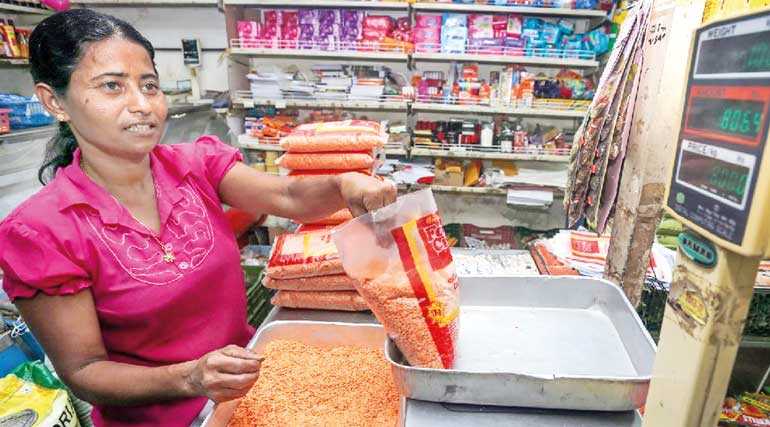Friday Feb 27, 2026
Friday Feb 27, 2026
Monday, 23 December 2019 02:06 - - {{hitsCtrl.values.hits}}

One-year freeze is on interest whilst SMEs may look to capital repayment relief as well
Meeting between special working group on banking sector and Prime Minister scheduled for tomorrow
Moratorium to Easter Sunday tragedy-hit tourism sector likely to be extended to 31 Dec. 2020 from 31 March 2020
Banking sector's non-performing loans up 39% in 1H19 (64% in 2018) and 46% for 8M19 according to Fitch
Banks and the Small and Medium Enterprises (SMEs) are awaiting greater clarity over the Government’s announcement late Friday on the moratorium on loans below Rs. 300 million as part of efforts to kick start the economy and relief to the private sector.
The Finance Ministry on Friday in a statement said President Gotabaya Rajapaksa and Prime Minister Mahinda Rajapaksa, who is also the Minister of Finance, Economy and Policy Development, have issued directives to Chairmen and CEOs of all banks to suspend recovery of loans obtained by the SME sector.
It said the Government has taken a decision to take up new initiatives to revive SMEs with outstanding debt not exceeding Rs. 300 million in each entity since recently announced tax reform initiatives provide substantial savings to all banks, including the Central Bank.
The Government expects the banks to use part of such savings to revive the SME sector on a priority basis.
As part of the stimulus, the Government removed the 2% NBT on banking, financial services and Insurance as well as 7% Debt Repayment Levy, paid by banks and other financial institutions.
Overall tax rate on banking and finance companies would reduce by 9% from 52% to 43%. Thereby having a positive impact on banks and finance companies.
However though the Government reduced the VAT rate to 8% the rate applicable on supply of Financial Services is being continued at 15%.
Central Bank sources said that it will discuss the announcement today whilst bankers who rely on Central Bank directive are awaiting greater clarity.
Some bankers said that moratorium is only on interest for one year whilst SMEs are eager to see a freeze on capital as well.
A support scheme for SMEs has been on the cards with a working group of bankers in discussion with the Prime Minister. A meeting of the group with Prime Minister had been originally scheduled for tomorrow.
As part of the new Government’s effort as well as banking sector support to stimulate the economy, the moratorium on the Easter Sunday tragedy-impacted tourism sector too was to be extended till 31 December next year from the original 31 March 2020. It is learned that the banking sector has extended relief to tourism sector loans outstanding worth over Rs. 100 billion. Analysts estimate the loss of Rs. 10 billion income from this measure.
How the ratings agencies will respond to further moratorium on SMEs following latest Government directive will be known later this week.
Fitch Ratings last month warned that pressure on banks' financial profiles due to challenging operating conditions - as reflected in the 2019 negative banking-sector outlook for Sri Lanka - became more apparent in the banks' 1H19 results.
The sector's non-performing loans (NPLs) continued to rise rapidly, up 39% in 1H19 (64% in 2018) and 46% for 8M19. The deterioration in asset quality reflects the challenging operating conditions, the aftermath of high loan growth, and the impact of the Easter Sunday attack in April 2019. The gross NPL ratio for the sector continued to rise, to 4.8% in 1H19 from 4.2% at end-1Q19 and 3.4% at end-2018. In addition, the stock of rescheduled loans has also been growing, indicating that asset quality could continue to remain weak.
The sector's loan growth is muted, after strong loan expansion during 2015-2018. It rose by only 1.3% in 8M19, reflecting weak borrower sentiment and subdued economic activity. Fitch believes loan growth could remain muted, particularly until the upcoming election cycle has concluded in 2020. The loan/deposit ratio for the sector decreased to 87% by end-1H19 from 91% at end-2018, indicating that funding and liquidity pressure has eased.
After-tax profit for Fitch-rated banks in 1H19 dropped, with net income of Rs. 41 billion (1H18: Rs. 56 billion; 2018: Rs. 114 billion), amid slower loan growth, increased credit costs and higher effective taxes. Recent capital-raising has faced execution risks, with issuance being undersubscribed. Still, further capital issuance is planned for 2H19 and capital raisings are likely to continue due to ongoing capital needs. Basel III capital standards came into full effect in 2019, with banks being able to comply with the minimum requirements.
The Friday’s directives from the President and the Prime Minister also incorporate redresses to SME paddy millers as well since the Government expects them to re-energise their milling operations to improve the competitiveness in the market, and expects their capacities to be active during the 2019/20 Maha season.
This concessionary action will be followed by a comprehensive package coupled with already announced tax concessions designed by the Ministry of Finance, Economy and Policy development and the Central Bank, which will support both the lender and the borrowers, especially from the SME sector.